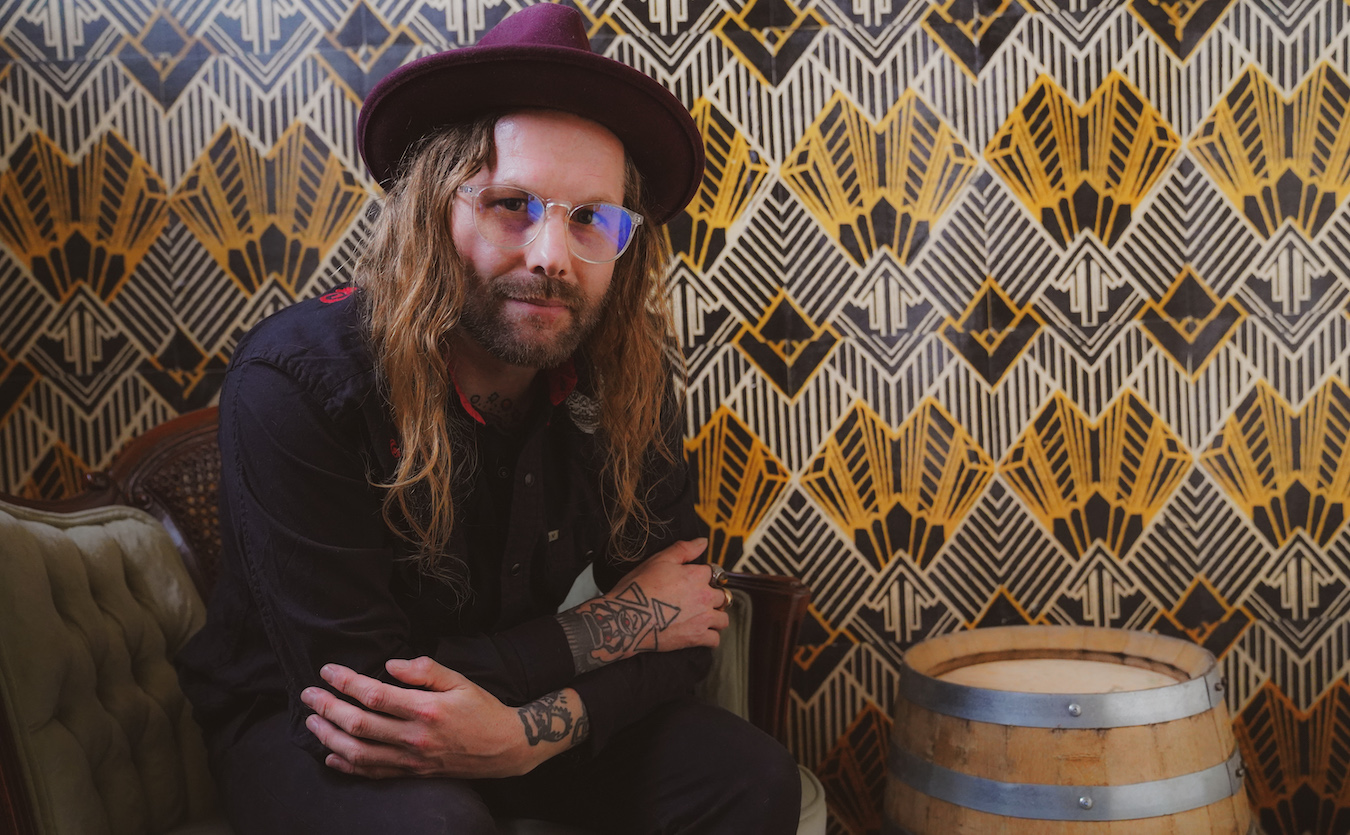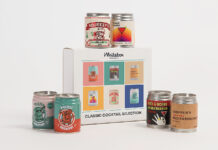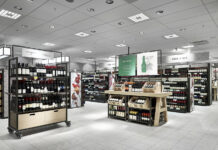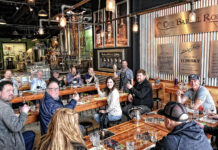
Moving from Detroit to Cleveland and San Francisco, then back home to Detroit, James Downs first fell in love with cocktails and spirits working at a historic Detroit bar, then honed his craft in pioneering cocktail city, SF.
He is currently the bar manager of Kiesling, a historic, brick-walled, century-old space built by the German Kiesling family around 1890, restored from its saloon glory days and reopened in Detroit’s Milwaukee Junction neighborhood in 2018. Building owner Carlo Liburdi and managing partner Rich Perry invested in a couple year restoration, uncovering a beautiful nature mural on the walls, original wood wainscoting and building additions like leather banquettes. Kiesling exudes Old World saloon vibes in the space’s storied history as a general store, cafe bars and apartments since the early 2000s, only to be abandoned in 2015.
Crafting a menu at Kiesling that includes classics and creative house drinks, as well as a curbside to-go drinks, Downs lives with his fiancee and their dogs in Detroit, where he loves to sit on the porch playing guitar with his dogs.
In his own words, Downs tells us about his journey into the bar world, how he decides what brands to stock and how they are surviving pandemic.
What led you into the cocktail and bar world?
What led me to it was sort of a spoof. I was studying mechanical engineering and had all intentions of doing that for a living. I was going to work in wind power and alternative energy. I was offered a couple jobs which I couldn’t take due to the travel lifestyle and my unwillingness to do it unless I could take my dog with me.
At the same time, I had picked up work at Detroit’s first classic cocktail bar, The Sugar House, first working the door and soon filling other roles, ending as a shift manager. I became very passionate about what I was doing behind the bar. It felt like home, to be honest. Once I had actually come to the conclusion I was not going to do anything with my education, I really dove in. I started dating someone from Detroit who had moved to California for school. After visiting California, I knew that’s where I wanted to be. I knew I wanted to be in a bigger market, gain more experience and learn different ways of doing things. So I decided to move to San Francisco. Once that decision was in my head I became obsessed with what was going on out there and kept a close eye on the scene. I ended up saving up a few grand and was ready to pull the trigger on moving, but wasn’t actually sure how it would happen.
One very, very cold, slow February night I was working at Sugar House and a party of 16 people came in, one of them being Richard Woodruff (Chardmo, as everyone in SF knows him). I served them, made their drinks, and they stayed until about an hour after we closed. Once Chardmo told me he was from SF, we exchanged info and kept in contact. He said if I was ever out that way, to give him a call.
So I thought, ‘Rad: now I know someone there,’ which was a bit of a relief. I called him when I was about ready and told him I was planning to move in three months. He told me the bar he worked at had someone leaving in a few months and a bartending position was going to be open. I sent him my resume and he gave it to their owner, Isabelle Manchester. I flew out for an interview and was offered a job. I moved 3 months later. My start there was a bit turbulent, but that could be a whole other article.
How does being based in Detroit influence your bar’s style and operations?
Being based in Detroit is our style, honestly. It is easily relatable to Oakland for me. I’ve always said Detroit and Oakland are very similar in so many ways, especially in demographics, style, music, art, which are shaped and inspired by similar struggles. Detroit has grit. She will build you up and coddle you, but also tear you down just as fast.
Our city is 80% African American, so knowing/learning/respecting black history is a must. It is also a city that has definitely had hardship but has experienced a resurgence in recent years, especially in food and drink. The important thing is getting to know your neighbors and being a positive part of the community. That means showing respect to those who have lived here through harder times, learning their struggle, and figuring out how to be part of a positive change that isn’t displacing people and gentrifying.
Our bar is a neighborhood bar. You can get anything from a $5 shot-and-beer special to a seasonally-driven craft cocktail. We host local DJs once a month, host a Tarot night and monthly pop-ups with bartenders and chefs from other establishments, called Spillin Cups. It’s a really great way to get people to work together that normally haven’t had the chance. We also try to tie charities and local organizations in with those nights.
Detroit is gritty, like I said. Stylistically, our bar is every bit Motown, soul and R&B, as much as it is Iggy and the Stooges, Danny Brown and Carl Craig. What our bar and city is not, however is Kid Rock [a Michigan native]. Ya dig?
What is your philosophy on deciding what brands/bottles to stock?
This to me, is simple. We carry brands that care about people, brands that do their best to be sustainable, help the industry and support farmers and their communities. We value those relationships and work together to build them as much as possible.
How do you educate customers on small batch, quality spirits?
We definitely give brand recognition on menus, for one. We also have the Comstock Saloon [in San Francisco] philosophy, “You’re a bartender, talk about life; not drinks.” If you’re doing that right, conversations should happen organically. All of these rare spirits, apothecary bottles, bitters, etc., are just a door prize to good service. Don’t get me wrong, I love to geek out with all of it, a whole lot. But I’d much rather build rapport with our guests, learn their names, learn their stories, which makes talking about spirits and whatnot a whole lot easier and more engaging. It also makes their story and our story cohesive. We will taste anyone on anything they are curious about, and be able talk about it intelligently without coming off elitist or degrading.
Personally, why I love what I do is that I get to learn history, geography, science, horticulture and a whole lot more when I learn about the products we serve, which makes finding something relative to someone else a whole lot easier. Plus, you tie in the human condition or experience and, bam! Talking booze to people who may not often drink, or don’t know much about what they are drinking is actually pretty easy. We also focus hard on keeping staff trained and current with everything we carry.
How are you surviving pandemic and what new forms of business have you implemented?
Surviving the pandemic has been interesting, to say the least. We had to shut down in March due to quarantine, only to reopen in May, and to have to shut down again. Then July happened, which was such a turbulent month in itself. Our beloved GM Rob Wilson, had left his position here at Kiesling, which wasn’t easy on us since we are family here. His vision, combined with the ownerships’ vision for Kiesling, is what helped make it the place that it is today. He also gave me an opportunity in the bar. I am forever grateful.
One day after he left, my little sister passed away at 35 years old due to liver and kidney failure from drinking and complications related to medication she was taking for an autoimmune disease. Shortly after that we lost a part of our Alembic family [in San Francisco], Richei, and I wasn’t sure if I could go back to work or be in a bar anymore, especially right away.
Kiesling being the place that it is and my colleagues being the people that they are — along with the family I’ve made in SF and friends I’ve met along the way — have all given me the help and support when I needed it. I wasn’t rushed to jump back into the full swing of things right away, which I am thankful for. I think that month (July) really put a lot of things into perspective, which is why I am able to do this interview with you today, newly engaged and having just moved into my first house with my fiancee.
Up until July of this year, Michigan did not allow to-go cocktails. Once they did, we switched to that model only. But Detroit doesn’t have the density of other cities and our lack of public transportation makes it very difficult to survive off of to-go drinks alone.
As of July in Michigan, if you don’t show 70% of sales coming from food, you aren’t able to serve guests inside and are limited to only outdoor seating. While the city and state have made some strides, they are also moving at a snail’s pace to approve permits on expanding outdoor seating or streetside seating such as parklets and patio extensions.
We have a capacity of 35 people that we are able to serve with those restrictions. Luckily, we started an expansion into the adjacent space with a kitchen and added seating pre-COVID. That was just finished, so we’re awaiting inspection to be able to reopen at half capacity indoors. With weather being such a factor here, and being a destination bar without a lot of space to drink, it has been a struggle.
How do you envision the bar world evolving in the coming years?
It’s hard to say. I know for us a huge focus is on our team’s health, both physical and mental, and quality of life inside and out of work. We value being good neighbors, serving our community, and pushing each other to excel at the bar, while also supporting each other on projects away from the bar. What I do know is the world is hurting, people are hurting. We need to be there for them. They need us and we need them. We are here to hopefully put some joy in folks and encourage them to pass that on to others. One person, one day at a time.
As for me, I’m focused and inspired again. Our community may lose some great people, some may leave and come back, but I don’t really know what else to predict. I think we will really see how this has affected us as a society and an industry sometime around next spring and summer. For now we have to hunker down and work together, check in on friends and family and just move a little slower and more calculated. Practice a little more patience and more compassion.








